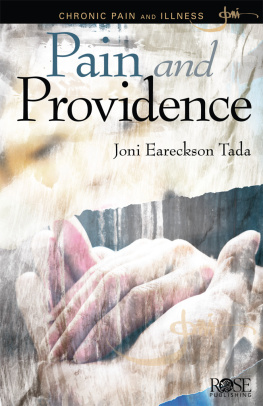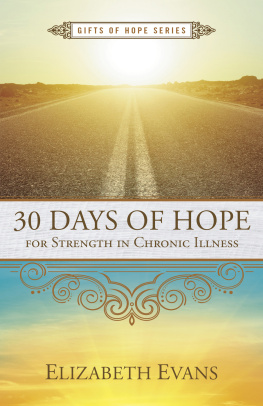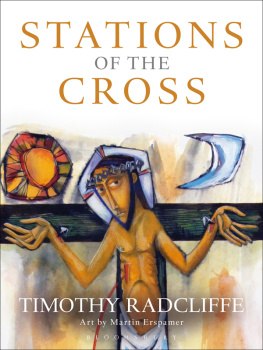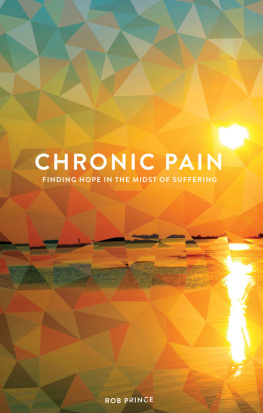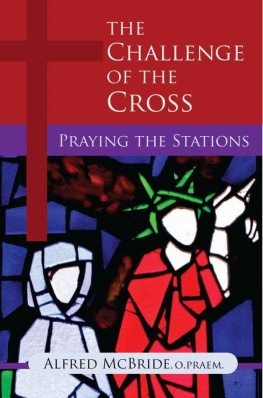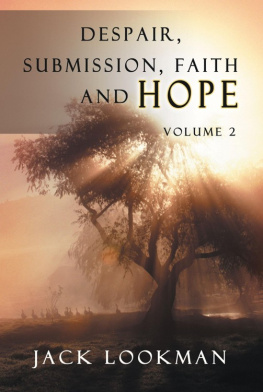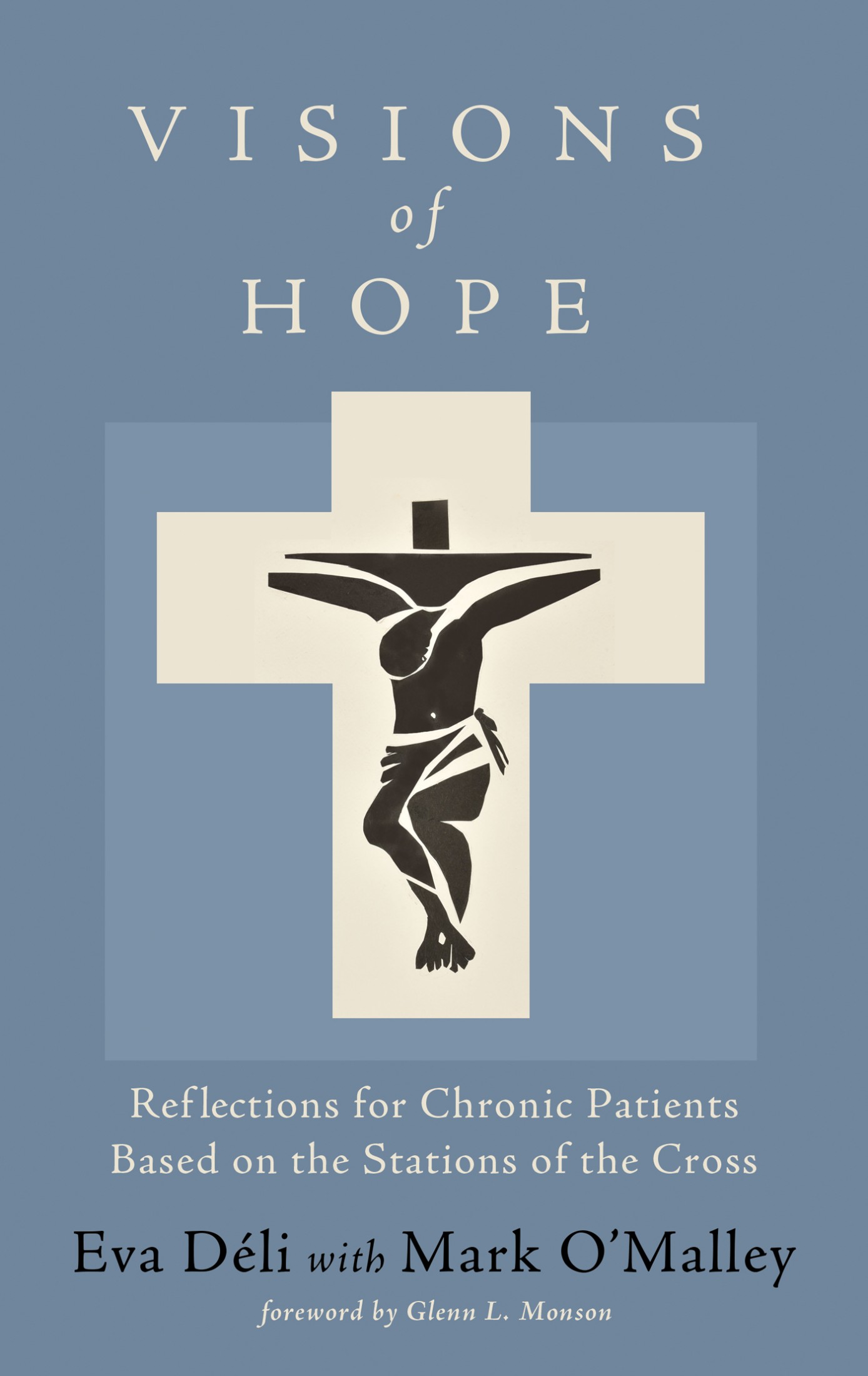Visions of Hope
Reflections for Chronic Patients Based on the Stations of the Cross
Eva Dli with Mark OMalley
Illustrations by Eva Dli
Foreword by Glenn L. Monson
Visions of Hope
Reflections for Chronic Patients Based on the Stations of the Cross
Copyright 2020 Eva Dli. All rights reserved. Except for brief quotations in critical publications or reviews, no part of this book may be reproduced in any manner without prior written permission from the publisher. Write: Permissions, Wipf and Stock Publishers, W. th Ave., Suite , Eugene, OR 97401 .
Scripture is taken from the New King James Version. Copyright 1982 by Thomas Nelson. Used by permission. All rights reserved.
Scripture quotations marked (NIV) are taken from the Holy Bible, New International Version, NIV. Copyright 1973 , 1978 , 1984 , 2011 by Biblica, Inc. Used by permission of Zondervan. All rights reserved worldwide. www.zondervan.com The NIV and New International Version are trademarks registered in the United States Patent and Trademark Office by Biblica, Inc.
Scripture quotations are from The ESV Bible (The Holy Bible, English Standard Version), copyright 2001 by Crossway, a publishing ministry of Good News Publishers. Used by permission. All rights reserved.
Scripture quotations marked (NLT) are taken from the Holy Bible, New Living Translation, copyright , 2004 , 2015 by Tyndale House Foundation. Used by permission of Tyndale House Publishers, a Division of Tyndale House Ministries, Carol Stream, Illinois 60188 . All rights reserved.
Scriptures marked as (GNT) are taken from the Good News TranslationSecond Edition by American Bible Society. Used by permission.
Resource Publications
An Imprint of Wipf and Stock Publishers
W. th Ave., Suite
Eugene, OR 97401
www.wipfandstock.com
paperback isbn: 978-1-7252-7003-9
hardcover isbn: 978-1-7252-7004-6
ebook isbn: 978-1-7252-6995-8
Manufactured in the U.S.A. 03/20/20
To my Parents, Jzsef Dli and Etelka Hudk
List of Poetry
I, Give Me Strength by Rabindranath Tagore
When I Am Afraid, I Put My Trust in You. Psalm : and Isaiah :
II, All Things by Hadewijck II th century
Three Friends by Ella Wheeler Wilcox
III, In This Short Life that Only Lasts an Hour ( 1292 ) by Emily Dickinson
Adversity Then Strength by Henry Wadsworth Longfellow
IV, If Only We Understood by Anonymous
V, Prologue of the Earthly Paradise () by William Morris
VI, Two Kinds of People by Ella Wheeler Wilcox.
VII, My Life Had Stooda Loaded Gun () by Emily Dickinson
VIII, Prayer of Saint Francis of Assisi
Love Is Strength by George MacDonald
IX, Up-Hill by Christina Rossetti
Solitude by Ella Wheeler Wilcox
X, In Tenebris by Thomas Hardy
XI, Echo by Christina Georgina Rossetti
What Will You Give? by Rabindranath Tagore
XII, I Felt a Funeral, in My Brain, () by Emily Dickinson
Elegy to the Old Man Hokuju by Priest Buson
XIII, Remember by Christina Georgina Rossetti
Gradual ( Esdras :; Psalm :)
XIV, Song by Christina Georgina Rossetti
Verse from Song of Myself by Walt Whitman
XV, Hope Is the Thing with Feathers() by Emily Dickinson
Dreams by Langston Hughes
Foreword
It is rare that one reads a book where religion and science are not at odds, if not warring altogether. Religious folks call into question the assumptions and assertions of scientists. Similarly, scientists call into question the assumptions and assertions of religionists. What a delight it is to read an author who has the insight and wisdom to appreciate the gifts of both. Indeed Eva Deli has not only the rare ability to appreciate both, but the ability to understand in some depth how each discipline can coexist with the other and provide a healing balm to all who are on the journey of life-threatening illness. She is clearly both a fine scientist and a person of faith, who seeks to bring a word of healing, understanding, and compassion to a suffering world.
Eva Deli is also an artist, and perhaps this is where her gifts are most evident. I first encountered Evas artistry when she exhibited the Stations at my parish in Austin, Minnesota during a Holy Week observance. People came and viewed the stations, reflected on their meaning for them, said prayers, and departed, I believe, with a stronger sense of what the Suffering Christ experienced.
The connection Eva makes between the Stations and the progression of a terminal illness is remarkable and shows her artistic insight. From Station , where Jesus is condemned though innocent, through Station XIV, where Jesus is laid in the tomb, we see a remarkably accurate parallel to what the stations of a terminal illness are. There is no manipulation of the Stations to see how the stations of a terminal illness fit precisely with the experience of Jesus journey to Golgotha.
When Jesus is condemned, though innocent, is that not the experience of one who receives a terminal diagnosis? We ask, But what have I done to deserve this? The assumed answer is, Nothing. You are innocent. The thrice falling of Jesus also is uncannily like the setbacks which are so common in a patients journey. One day we feel stronger, the disease seems to be in remission, and the next, another tumor appears and we fall again. The persons who assist Jesus, from his mother to Simon, to Veronica, also seem very familiar. Family and friends, physicians and nurses, and yes, strangers too, provide the care and encouragement that are so important at each station of the journey. Even the experience of death, which begins with being parted from our earthly possessions, pictured as Jesus being stripped of his garments, and ends with our death, pictured in Jesus death on the Cross, fits our experience so well.
This book is a gift to anyone looking for meaning and peace during the journey of terminal illness. The religious quotes are abundant, as is counsel in how to manage ones thoughts and emotions during this torturous yet holy time. The insights of Eva Deli the artist, the scientist, the philosopher, and the religionist are all present here and offered with humility, generosity and grace.
Glenn Monson PhD, Senior Pastor at Mount Olive Lutheran Church, author of Afflicting the Comfortable, Comforting the Afflicted: A Guide to Law and Gospel Preaching
Preface
When you come to the end of all the light you know, and its time to step into the darkness of the unknown, faith is knowing that one of two things shall happen: Either you will be given something solid to stand on, or you will be taught to fly.
Edward Teller
Throughout human history, the perception of a disease often reflected superstition and a lack of awareness. In the Middle Ages, epidemics were viewed as a punishment of sins. This notion is echoed in the gospel of John : (NIV) Who sinned, this man or his parents, that he was born blind? In his response, Jesus dispels prejudices and fear. Neither this man nor his parents sinned, but this happened so that the works of God might be displayed in him. Patients with AIDS, diabetes, cancer, and other chronic diseases are still in need of His wisdom. This is especially true for the highly emotional period following the diagnosis, which tests the relationship dynamics with family and friends.
Following the Second World War, a better understanding of human physiology, the discovery of DNA, vaccinations, and other breakthrough research led to optimism and belief in the power of modern medicine. The appearance of novel diseases, such as AIDS, SARS, ebola, and others, has poured cold water on that optimism. Although chemotherapy, radiation, immunotherapy, and surgery substantially extended the survival of cancer patients, the complexity of the underlying mechanisms has made progress in treatment more challenging than initially thought. The increasing life expectancy and the unintended consequences of our modern technologies have also increased the prevalence of certain cancers. Western-style medicine has also been confounded by the psychological side effects of chronic conditions. Everyone has lost uncles, aunts, other family members, and friends to cancer, AIDS, or other chronic diseases. These losses are always painful.


